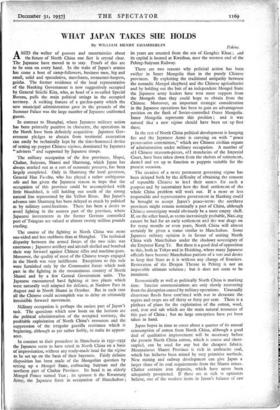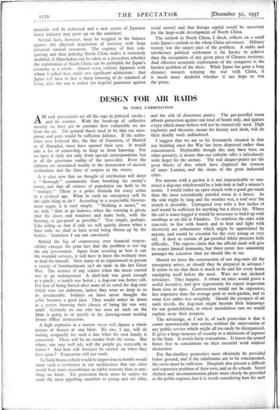WHAT JAPAN TAKES SHE HOLDS
By WILLIAM HENRY CHAMBERLIN
AMID the welter of guesses and uncertainties about the future of North China one fact is crystal clear. The Japanese have moved in to stay. Proofs of this are to be seen on every hand. In the wake of Japan's armies has come a host of camp-followers, business men, big and small, solid and speculative, merchants, restaurant-keepers, geisha. The former residence of the local representative of the Nanking Government is now suggestively occupied by General Seiichi Kita, who, as head of a so-called Special Bureau, pulls the main political strings in the occupied territory. A striking feature of a garden-party which the new municipal administration gave in the grounds of the Summer Palace was the large number of Japanese uniformed guests.
In contrast to Shanghai, where Japanese military action has been primarily punitive in character, the operations in the North have been definitely acquisitive. Japanese Gov- ernment pledges to abstain from territorial annexation can easily be technically kept by the time-honoured device of setting up puppet Chinese regimes, dominated by Japanese " advisers " and supported by Japanese troops.
The military occupation of the five provinces, Hopei, Chahar, Suiyuan, Shansi and Shantung, which Japan has always marked out as a sort of economic preserve, has been largely completed. Only in Shantung the local governor, General Han Fu-chu, who has played a rather ambiguous role and has given the Japanese reason to hope that the occupation of this province could be accomplished with little bloodshed, is still holding out south of the strong natural line represented by the Yellow River. But Japan's advance into Shantung has been delayed as much by political as by military considerations. There has been a desire to avoid fighting in the eastern part of the province, where Japanese investments in the former German controlled port of Tsingtao are valued at almost twenty million pounds sterling.
The course of the fighting in North China was more one-sided and less stubborn than at Shanghai. The technical disparity between the armed forces of the two sides was enormous ; Japanese artillery and aircraft shelled and bombed their way forward against Chinese rifles and machine-guns. Moreover, the quality of most of the Chinese troops engaged in the North was very indifferent. Exceptions to this rule were furnished only by the Communist forces which took part in the fighting in the mountainous country of North Shansi and by a few Central Government units. The Japanese encountered hard fighting at two places which were naturally well adapted for defence, at Nankow Pass in August and in North Shansi in October. But in each case all the Chinese could accomplish was to delay an ultimately irresistible forward movement.
Military occupation is perhaps the easiest part of Japan's task. The questions which now loom on the horizon are the political administration of the occupied territory, the profitable exploitation of North China's resources and the suppression of the irregular guerilla resistance which is beginning, although as yet rather feebly, to make its appear- ance.
In contrast to their procedure in Manchuria in 1931-1932 the Japanese seem to have acted in North China on a basis of improvisation, without any ready-made head for the regime to be set up on the basis of their bayonets. Fairly definite disposition has been made of the Mongolian question by setting up a Mongol State, embracing Suiyuan and the northern part of Chahar Province. Its head is an elderly Mongol Prince named Yun ; its sponsor is the Kwantung Army, the Japanese force in occupation of Manchukuo ; Peking. its years are counted from the era of Genghiz Khan ; and its capital is located at Kweihua, war the western end of the Peking-Suiyuan Railway.
There are two reasons why political action has been swifter in Inner Mongolia than in the purely Chinese provinces. By exploiting the traditional antipathy between the nomadic Mongol shepherd and the Chinese agriculturist and by holding out the bait of an independent Mongol State the Japanese army leaders have won more support from the Mongols than they could hope to obtain from the Chinese. Moreover, an important strategic consideration in the Japanese operations has been to gain an advantageous position on the flank of Soviet-controlled Outer Mongolia. Inner Mongolia represents this position ; and it was natural that a new regime should have been set up first there.
In the rest of North China political development is hanging fire and the Japanese Army is carrying on with " peace preservation committees," which are Chinese civilian organs of administration under military occupation. A number of old Chinese museum-pieces, old mandarins of the Imperial Court, have been taken down from the shelves of retirement, dusted and set up to function as puppets suitable for the present occasion.
The creation of a mare permanent governing regime has been delayed both by the difficulty of obtaining the consent of reputable Chinese to lend their names for such a purpose and by uncertainty how the final settlement of the whole China problem will work out. If a more or less responsible and representative government in Nanking could be brought to accept Japan's peace-terms the northern provinces might remain nominally a part of China, although Chinese sovereignty would obviously be a mere empty shell.
If, on the other hand, as seems increasingly probable, Nan:sing cannot be had for an early settlement and the war drags on for many months or even years, North China will almost certainly be given a status similar to Manchukuo. Some Japanese military opinion is in favour of uniting North China with Manchukuo under the shadowy sovereignty of the Emperor Kang Te. But there is a good deal of opposition to this, both in Tokyo and in Hsinking, where many Japanese officials have become Manchukuo patriots of a sort and desire to keep that State as it is without any change of frontiers. Restoration of the Dragon Throne in Peking is not an impossible ultimate solution ; but it does not seem to be imminent.
Economically as well as politically North China is marking time. Interior communications are only slowly recovering from the disruption caused by military operations. Unusually disastrous floods have combined with war to devastate the region and crops are off thirty or forty per cent. There is a plethora of plans for the exploitation of the cotton, wool, coal, iron and salt which are the main natural resources of this part of China ; but no large enterprises have yet been taken in hand.
Japan hopes in time to cover about a quarter of its annual consumption of cotton from North China, although a good deal of qualitative improvement will be necessary before the present North China cotton, which is coarse and short- stapled, can be used for any but the cheapest fabrics. Mountainous Shansi Province is rich in anthracite coal, which has hitherto been mined by very primitive methods. New mining and railway development can give Japan a larger share of its coal requirements from the Shansi mines. Chahar contains iron deposits, which have never been adequately prospected. If these are as rich as optimists believe, one of the weakest items in Japan's balance of raw materials will be redressed and a new centre of Japanese heavy industry may grow up on the continent.
Several facts, however, must be weighed in the balance against this physical acquisition of territory with large potential natural resources. The expense of first con- quering and then policing North China makes it extremely doubtful, if Manchukuo can be taken as a precedent, whether the exploitation of North China can be profitable for Japan's economy as a whole. Almost every realistic Japanese with whom I talked here made two significant admissions : that Japan will have to face a sharp lowering of its standard of living after the war is ended (no hopeful guarantee against social unrest) and that foreign capital would be necessary for the large-scale development of North China.
The outlook in North China, I think, reflects on a small scale Japan's outlook in the whole China adventure. Military victory was the easiest part of the problem. A stable and satisfactory political settlement is far harder to achieve than the occupation of any given piece of Chinese territory. And effective economic exploitation of the conquests is the hardest problem of the three. While Japan has gone a long distance towards winning the war with China, it is much more doubtful whether it can hope to win the peace.

































 Previous page
Previous page